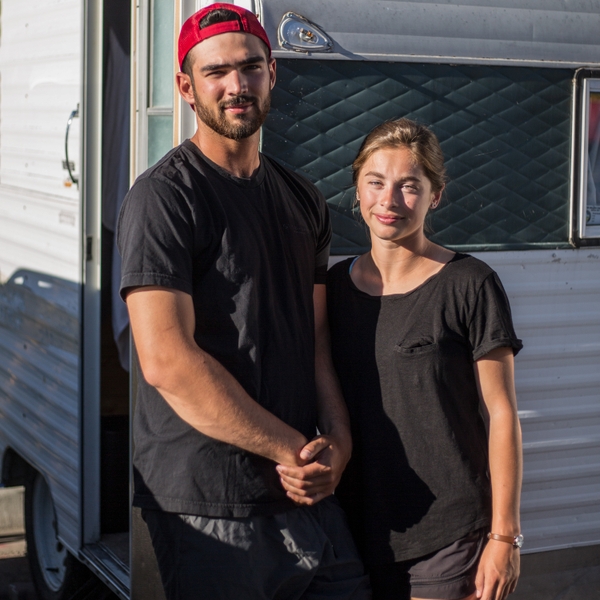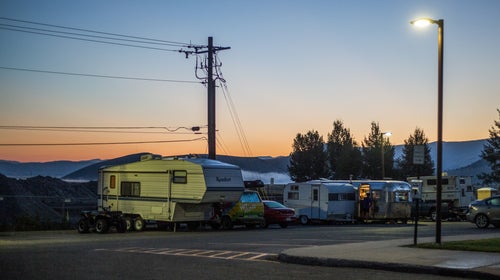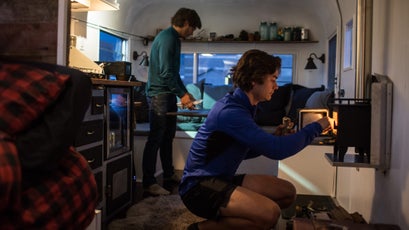The New American Dream Home Is a Parking Lot
The housing crisis in the Mountain West has gotten so bad that some folks are happy to rent a clean piece of pavement
New perk: Easily find new routes and hidden gems, upcoming running events, and more near you. Your weekly Local Running Newsletter has everything you need to lace up! .
Earlier this year, Josef and Ben Sipiorski had a big idea for their college summer break. The brothers, ages 21 and 20, respectively, had spent most of their lives in rural Carpentersville, Illinois, a flat suburb an hour northwest of Chicago. They yearned for the mountains, somewhere they could learn how to fly-fish, climb, and mountain bike. They decided to move to Jackson, Wyoming, which they had previously visited on a snowboarding trip.
Their dad suggested they live in their grandfather’s camper. The 1965 Streamline Countess was falling apart, but the brothers gutted it and used old barn wood and other reclaimed materials to refurbish the trailer into a beautiful, modern mobile home, complete with a miniature wood stove, glass cabinetry, wood floors and shelving, and, of course, succulents. If nothing else, it was Instagram-ready: .
That spring, the Sipiorskis searched for work from their home in Illinois. Getting a job wasn’t hard. The unemployment rate in Jackson Hole is just 2.6 percent, and the town is hungry for employees. Since 2012, jobs—20 percent of which are in the service industry—increased by 17.2 percent, and the effective population (including seasonal workers, commuters, and visitors) in summer ballooned by 91 percent. The City of Jackson quickly hired the brothers as lifeguards. The pay was $16 an hour—twice as much as they made back home doing the same job. In May, they rented an SUV to pull the camper and hit the road for Wyoming.
When the Sipiorskis arrived, though, they encountered a problem: They couldn’t find anywhere to park their new home. The only place available was a field. It cost $600 a month and had no hookups for electric or water. It was also in Victor, Idaho, nearly an hour from Jackson.
They had driven smack into a housing crisis that’s gutting communities across the Mountain West. Dream towns like Jackson have always been pricey places to live, but recent trends have turned a longtime concern into a defining issue. The median household income in town is $68,000. Twenty-two percent of males ages 25 to 34 live below the poverty line. In many places, there are simply no viable rental options for seasonal workers, or even for full-time employees earning middle-class salaries.
Fortunately for the Sipiorskis, Jackson had an unexpected option that suited them just fine. In mid-June, their manager at Parks and Rec told the brothers about a new program aimed at addressing Jackson’s unprecedented housing crisis: City employees could camp for free behind the rec center. The camp—population: eight—was located on a city-owned lot a few blocks from the center of town. In June, the city had launched the summer-long pilot program to gauge the viability of a municipal campground that would give its seasonal workforce an affordable place to live while easing the impact this population has made while camping on surrounding public lands.
Suddenly, their drive went from 60 minutes to 30 seconds; their rent from $600 to $0. The Sipiorskis were able to do something few in Jackson could: live in town and save money. They just had to embrace living in a parking lot.
“I mean, I know I’m only in college and not living here permanently, but I definitely don’t mind living like this in the summer,” says Josef. “It’s better than staying in a tent,” says Ben, “which is what some people have to do.”
Housing shortages in mountain towns are not necessarily a new problem—limited land means less development—but recently it has reached a fever pitch, and it isn’t unique to Jackson. Aspen Ski Co. is housing employees in a parking lot full of 350-square-foot tiny homes. In Tahoe City, where median rents for two-bedroom places have increased 52 percent to $1,900 a month since 2012, city officials have proposed paying owners to rent idle second homes to local employees. Whistler, which has a 650-person waiting list for workforce housing, can’t build units fast enough to accommodate its growth in tourism.
But Jackson may just represent the apotheosis of the issue, due to the combination of the rapid job growth and drastically wide income gap. According to a 2016 from the Economic Policy Institute, Jackson has the highest rate of income inequality of anywhere in the country. Meanwhile, job growth has outpaced residential growth by a factor of three. The median price of listed homes in Jackson is $1.375 million. Rentals are limited and expensive—the average one bedroom is more than $1,000 a month and next to impossible to find. While tourists flood the town square to dine on $40 elk medallions, the people serving them live in rooftop tents, in backyards, or in trailers and vans scattered around town.
It isn’t just seasonal service employees who are affected. The city is struggling to hire police officers, paramedics, teachers, and director-level positions—essential positions for a safe, functioning municipality. Chalk it up to a litany of issues—limited land, poor wages, outside investors buying up properties, the proliferation of short-term rentals, dramatic tourism growth, and Wyoming’s lack of an income tax, which leads the wealthy to buy rarely inhabited homes to use as tax havens.
“Just pick up a real estate brochure,” says Jim Stanford, city councilman and vice mayor, who is also a raft guide and champion of the pilot parking-lot program. “There seems to be no end to the people who can afford multimillion-dollar properties, while so many of the people who make up the heart of the community, who are trying to live and work here, are shut out.”
The parking lot took three years to approve. Stanford originally envisioned a large, open grassy field with rows of tents, but that idea was shut down over concerns about cleanliness and community degradation. “I felt very strongly that it was irresponsible of us to pretend that this doesn’t exist or stick our heads in the sand and put the impact on the surrounding forest,” says Stanford, who himself used to be one of the many individuals who camp on nearby public lands to save on rent.
In mid-June, the council settled on the out-of-sight parking spaces behind the rec center. In the original wording, the city would allow 20 people to live there for $465 a month each, from June 16 to September 4—the busiest season in Jackson. To alleviate concerns about dirtbags and ne’er-do-wells descending upon the parking lot, the city came up with rules that bordered on the draconian: no fires, awnings, pets, smoking, or generators; any and all sleeping, sitting, cooking, washing dishes, and eating had to be done within the confines of the vehicle. The program forbade tents and trailers, meaning residents had to be in their car or rooftop camper at all times—you could live there, but living there.
To ensure that the parking lot units went to locally employed people, the town reached out to area businesses, which in turn offered the deal to their staffers. The employers sold exactly zero permits. Turns out that nearly $500 for an asphalt parking space with limited electric, no water, and a shared Porta-Potty is not an appealing offer.
“The employee looked at it and said, ‘If I’m going to be living out of my van, I’d rather live in the forest, as opposed to a parking lot,” says Steve Ashworth, director of the Parks and Recreation Department. “I get it. It’s worked out well for Parks and Recreation, but it has really provided no solution for the community as a whole.”
Ultimately, eight municipal workers stayed in the lot for the summer. In large part, that was because the city had agreed to cover its own employees’ rent in the lot and provide a membership to the rec center, where they could shower. (It’s open from 8 a.m. to 5 p.m., Monday through Friday.) “It’s a small but, I think, significant first step,” says Stanford.
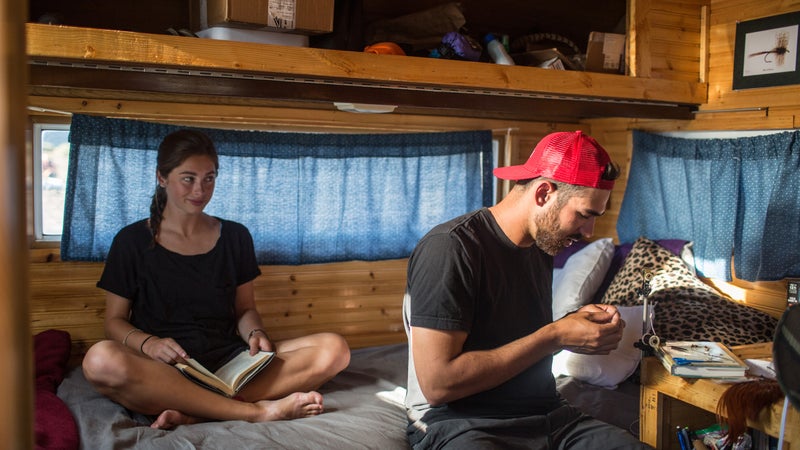
With such limited interest, the town also relaxed the no-trailer rule. The Sipiorski brothers jumped on the offer. So did their parking lot neighbor, Emily Rutz, who leads activities for the five- and six-year-old kids enrolled in Camp Jackson, which says it will “send your kids home happy, tired, often wet, and sometimes muddy!” Rutz is between degrees at the University of Vermont and a master’s in speech pathology from Boston University. When she and her boyfriend, Matt Guido, first arrived in town, they struggled to find somewhere to live despite having full-time jobs. They couch-surfed, house-sat, and got kicked out of a place that their landlord sold. “We were going to have to move home, live in a campground, or live out of a car,” Rutz says.
Then her manager told her the news about the city-approved parking lot camp. Guido got a job doing landscaping for the city so he could also live there, and the two bought a ten-foot trailer for $2,000. “We would have figured it out, but this is way easier and way more convenient,” says Rutz. “I wake up five minutes before I have to go to work.”
Three other Camp Jackson employees—Jon Fisher, Alex Rangel, and Drew Evans—all took up occupancy as well. But it wasn’t just young, seasonal employees utilizing the new government camp. Rutz’s neighbor was Ladee Johnson, 44, an employee of the city’s wastewater department. When I spoke to him outside his trailer, Johnson wore a black shirt that read “Not shy, just don’t like you.” He had recently separated from his wife, and the home he was renting has been sold. He bounced around hotels and slept in his 20-foot Komfort trailer or his truck, on roads both in town and in the surrounding county. “I just got tired of it all,” Johnson says. When his manager mentioned the lot, he took it. It allowed him to stay close to his kids. He called it a lifesaver. “Looking in the paper, you can find a two bedroom, one bath for three grand a month,” Johnson says. “Who can afford that? Unless you’re getting paid $30 an hour, and that’s not going to happen here.”
Had Johnson and the others not found the parking lot, there’s a good chance some would have ended up in Curtis Canyon, an infamous squatters’ camp just outside town in the Bridger-Teton National Forest. Every person I spoke to in Jackson warned me about . It happened often enough that I began to suspect that the in-town campground was more about the Curtis Canyon problem than the housing crisis. People described it as a “crazy,” “nefarious,” “man-camp” full of partiers who had exploited and trashed the national forest. Police have reported knife fights. In June, after another drunken fight led to another truck , Teton County Sheriff’s Lieutenant Matt Carr told the Jackson Hole News & Guide, “Curtis Canyon is reminiscent of the lawless towns of the Old West. We are just trying to keep the peace up there. We can’t enforce the camping regulations, and it’s becoming overrun. If you go up during the day, it’s pretty mellow because people are in town working. It gets crazy at nightfall.”
For many, though, it’s one of the few viable housing options. During the summer, anyone can legally camp for free in Curtis for five days, though then you’re supposed to not return for 30 days. Few follow these rules, however. Kevin Dehm, a 24-year-old raft guide, has camped in the canyon for the past several summers. Dehm usually heads there after dinner and looks for a spot for his 1999 Subaru Outback, which has a bed in the back. He says he knows around 20 people in Curtis and estimates that about 100 people live there. Though the Forest Service has complained about toilet paper in the sagebrush, Dehm says he always uses a trowel when he has to go. “I know how to poop in woods respectfully,” he says. Dehm worries about the reputation Curtis has developed, because the area provides a space many depend on. He acknowledged how rowdy it can get, but felt it was mostly outsiders, not forest residents, who gave the area a bad name. “You look at the news, and it gave us a bad look,” Dehm says. “We just need a place to stay.”
Of course, not everyone wants to sleep in their car or live in a parking lot, especially if it costs $465 a month. “Would I want to live in a municipal campground? Absolutely not,” says April Norton, who holds the unenviable job of heading up Jackson Teton County’s housing department. The housing crisis isn’t limited to low-wage employees fresh out of college. Ashworth says he’s offered an aquatics operations supervisor position—a job that pays $55,000 to $60,000—to five different people. None have accepted because they couldn’t afford a place to live. For a town facing a many-layered crisis, a municipal campground for employees helps, but it’s a niche solution.
Norton has more in mind. The town has new software and a new enforcement officer to crack down on illegal short-term rentals, particularly Airbnbs, which are legal only in certain areas near downtown. Meanwhile, 220 workforce units—apartments designated for locally employed people—are coming online this year to supplement the 817 already in town. The city is also rezoning some neighborhoods to allow accessory units, such as guesthouses, and mandating that any new developments include affordable housing, which is available to anyone making less than 120 percent of the median income. (For one person, that means making less than $76,776.) The city also hopes to expand the municipal camping program by partnering with a federal agency on a larger piece of land. Three more projects, including one for an 83,000-square-foot residential development, await approval.
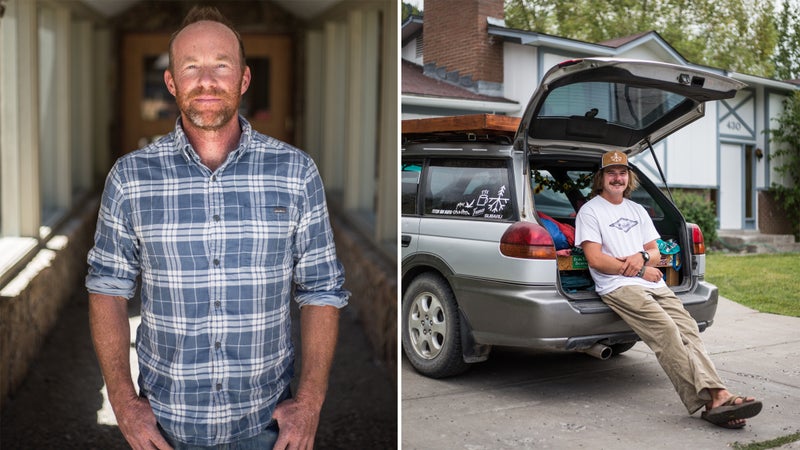
Norton acknowledges the town still has a long way to go. Its goal is to have 65 percent of its workforce living locally—in 2017, only 58 percent did. (In the 1990s, it was 85 percent.) Norton estimates they’ll need to add 2,800 units in the next ten years to reach that goal. “That means we have stable neighborhoods, we have people volunteering, we have children in schools, we know our neighbors, we have a stable tax base,” she says. “When we get below that, then we need to take pressing action.”
Such action generally faces fierce opposition—a 2016 tax proposal that would have split a one-cent general sales tax between transportation and affordable housing was soundly defeated. In a resort town where community character is prized, change is slow, and the opposition is well-funded and passionate. “They don’t want anything to change,” Norton says. “I get that. I totally do. I loved Jackson the way it was when I first moved here. The reality is Jackson is going to change, and we either can define that for ourselves or not.”
The local government, though, led by Mayor Pete Muldoon, believes it has a responsibility to keep the community intact. Muldoon, a political newcomer who was elected by 38 votes in 2016, is hoping the town will choose to embrace new options for Jackson. Muldoon is a musician and baggage handler at the airport. He refers to himself as “not particularly ambitious, financially.” In 2008, he lost his job and his house. He lived out of his RV as recently as four years ago. Muldoon was a champion for action on a municipal campground.
“You think of someone who’s been here for 20, 30 years, they’ve built up all of this trust, these relationships, all of that. When they leave, they don’t take that to Boise. It disappears at the county line,” Muldoon says. “When you lose that, it’s economically problematic, and it’s a travesty and tragedy for the community.”
Jackson was packed when I was in town. The cheapest room I could find was a Motel 6 single for $300 a night. So I did what most people in town do who don’t want to pay such a premium for a place to lay their head: I headed up to Curtis Canyon to sleep in the back of my car.
�����ԹϺ��� of town, the road to Curtis turns to gravel and ascends a switchback before reaching designated campsites. I found a flat space near a fire pit in a dirt lot, sat on the hatch of my rented minivan, and opened a beer. I went for a walk to see the view from the rim of the canyon. It was dusk. I could see the silhouette of the Tetons against a dark navy sky. Below, the airport glowed as the day’s last planes arrived. A steady stream of traffic headed for the town.
I walked back to my van by headlamp. I didn’t see any brawls, just a lot of people, fires, and vehicles. While I was gone, several cars had parked next to mine. I opened the hatch and crawled into my sleeping bag. I could hear people coming and going along the gravel road all night long. When I woke in the morning at 6:30, nearly everyone had gone. Their workday had already begun.
John Clary Davies () is an �����ԹϺ��� contributing writer.
